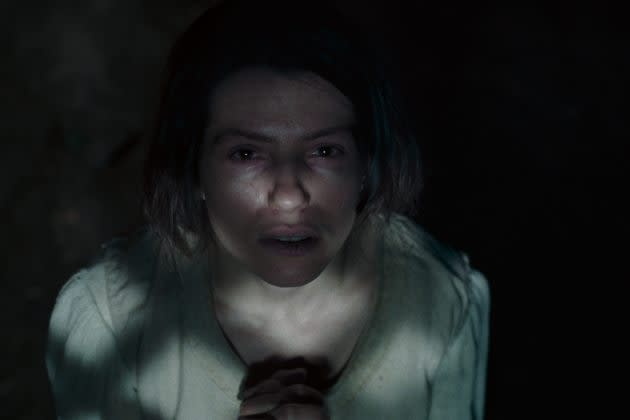‘The Devil’s Bath’ Review: Grim Austrian Folk Horror Chillingly Evokes A Dark Chapter In European History – Berlin Film Festival

“Please make me a good wife to Wolf,” murmurs Agnes (Anja Plaschg) on her marriage night, head bowed in front of the crucifix she has already set up in the conjugal bedroom of the tumbledown stone farmhouse where she will live from now on. Wolf (David Scheid), meanwhile, is carousing with his fellow villagers at the wedding celebration, in no hurry to join her. We are deep in the Austrian forest in the 1750s, where life is governed by the cruelties of each season and everything has its place. The point of a woman is to work and have children; anyone who fails in these conjoined vocations is simply a dead weight. Agnes will do her best, but her airy spirits soon are sinking.
The Devil’s Bath, directed by Veronika Franz and Severin Fiala, is the powerful story of one woman’s madness, but it is also the story of a way of life where the only escape hatch is death. Nagged constantly by a mother-in-law (Maria Hofstatter) who dictates even where she should keep her saucepans, Agnes wanders in the woods and prays far too much for the older woman’s liking. She responds to the soughing of the trees and birdcalls, but the forest harbors its own horrors; on one hill there are the remains of a woman who was executed for killing a baby, her rotting head in a box and her body still propped on the execution chair where it was severed from her neck.
More from Deadline
Agnes makes a morbid pilgrimage there. The sinner’s body has already been stripped for relics, the toes and fingers cut off. Agnes has one under her mattress. It is a charm, supposed to ensure she has plenty of children. But Wolf won’t touch her at night, resisting her timid overtures. The most he can manage is to masturbate while she turns her back to him. How is she to have the babies she is put on Earth to deliver?
Increasingly, Agnes hears a phantom baby’s cries. Soon she won’t get out of bed or wash herself; her depression falls over her like a shroud. When Wolf reluctantly takes her home to her mother, hauling her over his shoulder because she can no longer find the wherewithal to walk, he offers a simple explanation: “I’m sorry, but we can’t get our chores done.” No more needs to be said. Wolf’s mother now will step in, as she already has done with a show of righteous rancor, to cook, clean, trawl for fish in the river, tend the goats and feed the fire. For suffering Agnes, however, there must will be a much more terrible rupture. Fixed in her mind is the local priest’s warning against suicide. A suicide dies without making confession. She will spend eternity in hell. Suicide, says the priest, is worse than murder…
The Devil’s Bath is never less than unsettling. Sometimes it is devastating, as the directors amplify its uneasy mood with an episode of violence or despair. A Nazarene backdrop of fog surging around ruined castles and vertiginous cliffs give scale to the drama. Sometimes the camera ascends the mountain to show a sea of cloud settled over this unhappy valley like a thick white rug. A plangent score — composed by the star Plaschg, who is new to acting but a respected musician — is dominated by a mournful cello, maintaining a permanent sense of portent.
Franz and Fiala are relating a slice of verifiable history, but have given it the trajectory of a folk tale, the sensibility of horror and the vital sense that it is as much about us as it is about these peasants and their corrosive superstitions. Loneliness, desperation and the dread that we will never be able to do what is expected of us are perennials. This desolate place and time simply shows them in stark relief.
As the story unfolds, its inherent violence is let loose with full, visceral force. Cuts are seen to gush with blood, wounds fester with maggots and the corpse of a hanged man lies with his eyes staring to heaven; we are spared nothing.
Agnes, after she commits and then confesses to the crime finally that will give her leave from this world, shrieks for what feels like minutes in full-throated agony mixed with relief; the shadows of the confessional’s grille checker her face until she barely looks human. As Agnes, Plaschg is raw, direct and affecting, throwing herself into the character’s life and experience with the kind of passion we are very occasionally privileged to see from first-time actors. Rather than carrying the story, she seems to merge with her surroundings; the woman, her murmuring prayers, the mud and forest weave together to express an essential anguish.
It is not easy viewing, obviously. At the same time, this is not the kind of exploitative film where the audience is invited to wallow in a woman’s martyrdom as a spectacle. On the contrary: everything Agnes does is, intentionally or not, a form of resistance. A note at the end of the film soberly explains how many women sought release in the same way she did, a dreadful history that has been under its own cloud carpet of silence for hundreds of years. The Devil’s Bath gives it a voice.
Title: The Devil’s Bath
Festival: Berlin (Competition)
Sales agent: Playtime
Directors/screenwriters: Veronika Franz, Severin Fiala
Cast: Anja Plaschg, David Scheid, Maria Hofstätter
Running time: 2 hr 1 min
Best of Deadline
Berlin Film Festival 2024 Red Carpet: 'Seven Veils' Premiere On Day 7
Sundance Film Festival 2024 Photos: Award Ceremony, Film Premieres & Parties Gallery
Sundance Film Festival U.S. Dramatic Grand Jury Prize Winners Through The Years - Photo Gallery
Sign up for Deadline's Newsletter. For the latest news, follow us on Facebook, Twitter, and Instagram.

